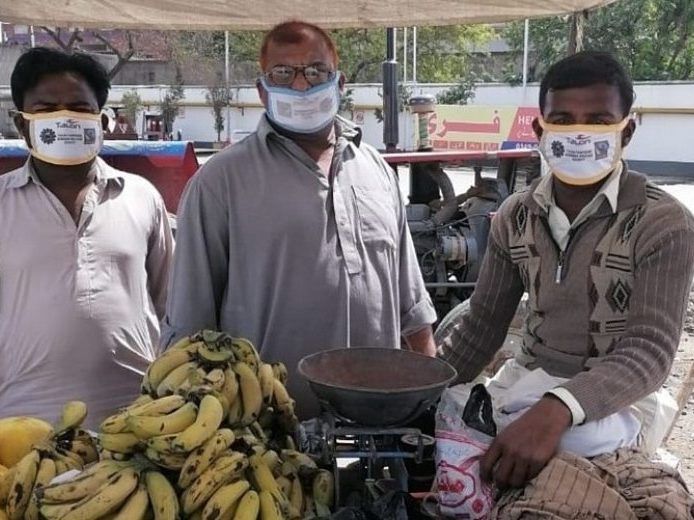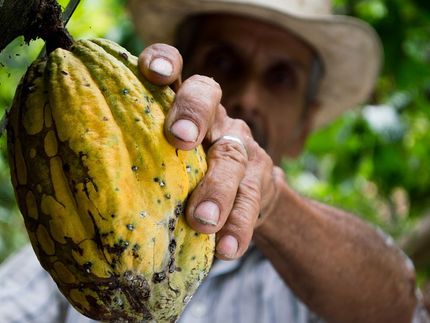Fairtrade Together: COVID-19 Briefing
Advertisement
Fairtrade is gathering updates from around the world about how COVID-19 is affecting producer organizations, family farmers, and workers.

Fairtrade International
While the health impacts in most countries in the global south are still behind Europe, North America and parts of Asia, governments there have taken precautions and issued guidance on limiting social contact and enacting physical distancing measures.
Fairtrade producer network field officers are providing additional guidance and support to producer organizations on health and safety measures that many are voluntarily adopting, including additional sanitization efforts and supplies for workers, revamping work shifts, and setting up physical barriers to provide protection for those working. Fairtrade staff are using technology to keep producers connected with each other, as well as with their Fairtrade contacts, such as by setting up WhatsApp groups and conducting meetings and trainings online.
Changes in audit procedures
Fairtrade’s independent certifier, FLOCERT, has amended their audit procedures during this time. All physical audits have been paused until 22 April 2020, which includes existing certified producers as well as new applicants. Because physical audits are required for new producer certification, this means that new certifications are paused. For traders, FLOCERT has developed a remote audit methodology. All existing certified trader physical audits scheduled through 30 June will change to remote audits, while new trader applications can continue under FLOCERT’s usual methodology.
Updates by product
In general, the transport of products may experience delays due to limitations at ports, whether due to reduced staffing for safety, or closure of some ports altogether. In addition, there is also a growing shortage of shipping containers, due to the US trade war with China and obvious effects of COVID-19, which has resulted in a bottleneck of empty containers staying in China.
Flowers: According to the Kenya Flower Council, an estimated $300,000 a day is being lost to the industry as a result of COVID-19, with 50 tonnes of flowers being dumped daily. Tens of thousands of workers on Fairtrade certified flower farms have lost their jobs, with no local work alternatives, and there is growing concern about the long-term financial stability of flower farms, if product shipments to Europe do not resume soon.
Bananas: Demand for bananas has remained strong thus far. Farms are taking necessary measures for increased sanitization, equipment (masks, gloves), erection of barriers between workers, and providing extra transport for workers to keep them safe. Activities on banana farms continue, but with reduced staff to lower the risk of virus transmission.
Coffee: Although Fairtrade coffee sales have remained strong so far thanks to retail sales, global coffee prices are highly volatile right now, due to uncertainty in the commodities markets. This puts producers in extreme uncertainty and threatens their livelihoods. The Fairtrade Minimum Price is a safety net for Fairtrade coffee producers during this time, ensuring they receive a guaranteed price of US$1.40 per pound for Arabica, plus the Fairtrade Premium on top of that of 20 cents per pound. The Fairtrade price for organic coffee is an additional 30 cents per pound.
In several high-volume producing regions, such as Honduras and Peru, movement has been severely restricted, which will impact the harvesting, transport and milling of coffees. An additional factor impacting coffee sales is the inability of growers to provide buyers with samples of coffee lots. Purchases are often being held up by the closing of trading offices, with traders working from home and unable to get into their labs to cup samples.
Cocoa: Various factors have led to a price decline in cocoa in several producing countries in Central/South America, which is normally well above the Fairtrade Minimum Price. Harvests are taking place in Central/South America and the Caribbean, but are impacted by movement restrictions and logistical challenges.
For the Ivory Coast, a new Fairtrade Minimum Price differential of US$212.14 per metric tonne was announced this week for deliveries between 1 April 2020 and 30 September 2020. Producers are working to ensure that all committed quantities can be exported, although there are some delays expected at ports in Ghana due to the temporary office closure of COCOBOD.
Tea: There has been a sharp decline in demand and price for tea from certain origins. Some of the major tea buying auctions have been suspended or postponed. The three-week lockdown in India disrupted the first-flush harvest and is preventing the essential maintenance of tea bushes. African tea origins have also been adversely affected by the drop in market demand and port restrictions.
Tea workers, who often live in poverty, are especially vulnerable. The majority of Fairtrade tea producers across India and Sri Lanka have been very active in creating initiatives to support their workers.
Cotton: The drop in retail sector sales has resulted in a sharp decline in demand and price for cotton. While most Fairtrade cotton has been harvested, all ginning units and spinning mills are closed, which means there is a financial risk for farmers if the market opens at a lower price. Land preparation and cotton sowing for the next season is expected to be affected by delays in seed distribution.
Sugar: To date, there has not been a major disruption in the production of sugar. However, producers are experiencing some delays in being able to ship their goods, as is the case with most commodities. The impact for summer harvests is not yet known.
Standing together as a community
Despite the unprecedented health and economic crises, Fairtrade producer organizations continue to take innovative action to protection the health and livelihoods of farmers and workers.
- In Colombia and other countries, Fairtrade banana producers are requesting older farmers and workers to remain at home for their protection, but are still providing them with financial compensation.
- Many Fairtrade flower producers are taking steps to protect workers from hardship. In Kenya, some organizations have put workers on paid leave, while another is splitting workers into shifts, so that they receive at least 15 days of pay for the month of April. Fairtrade Africa staff are working with producers to discuss additional options for support using Fairtrade Premium funds.
- Fairtrade certified tea estates in Asia have been proactive with regards to introducing health and safety measures, for example provision of face masks, sanitiser and training on handwashing and physical distancing.
- In Vietnam, Fairtrade certified Robusta coffee producer Eatu Fair Services and Agricultural Co-operative has carried out an awareness training to educate their farmers on the safety and health precautions to be observed during the pandemic. Fairtrade Premium supported the creation of informative posters that are displayed in and around the surrounding areas.
- In Tanzania, Fairtrade certified coffee producer KADERES is collaborating with Red Cross Tanzania to use community radio to raise awareness among farmers on COVID-19 causes, symptoms and prevention measures.
- Patricio San Martín, manager at Asociación de Productores Bananeros Orenses, a Fairtrade certified banana cooperative in Ecuador said, “We have taken the initiative to try to help the government that perhaps is not prepared and doesn´t have the resources of other nations, trying to bring bananas to different neighborhoods, mainly to the most affected people that live day by day and cannot go out of their houses to work. Now we know the lesson that Fairtrade was created for this, to help others, to be responsible with the environment and for many other things human beings have to change."
A sugarcane producer turns its rice crop into subsidy for farmers
Dama Farm Workers Agrarian Reform Beneficiaries Association, a Fairtrade certified sugarcane cooperative in the Philippines, used Fairtrade Premium funds to expand into rice production as an additional source of income for its farmers and members. This gives farmers more control over their lives, and more stability to ensure they can support their families all year round.
Due to government guidelines limiting movement and resulting scarcity of food provisions in the local markets, the cooperative decided not to sell the rice crop and instead distribute it as a subsidy to support its farmer members. The members were also provided with sessions on preventive measures for their well-being and safety.
“Everyone needs to be aware of the negative effects of COVID-19 on their heath and businesses and take appropriate measures,” said Daniel Diamante, chairperson of the cooperative. “We have to continue working in the fields, finish harvesting our canes, continue our rice farming and pruning of mahogany trees. These are our only sources of income. We should continue to pay salaries to our members and ensure we are prepared as an organization. Our resources might be limited but our will to survive this outbreak is stronger. We will stand together as a community and overcome this calamity.”
Continuing to make a difference
Fairtrade and our producer networks are continuing to actively contact producer organizations to respond to their needs quickly and effectively. Farmers and workers in the global south are often living on thin margins even during “normal” times. We are conscious that many in the global north are facing their own economic insecurity and health impacts.
We urge everyone to act safely, and to continue to buy Fairtrade whenever possible. Many farmers and agricultural workers are going to work each day to keep the world's food supply in tact. By supporting Fairtrade farmers and workers during these times, we support them to protect the health and safety of their communities, to weather the economic challenges ahead, and to stand together in global solidarity.


































































